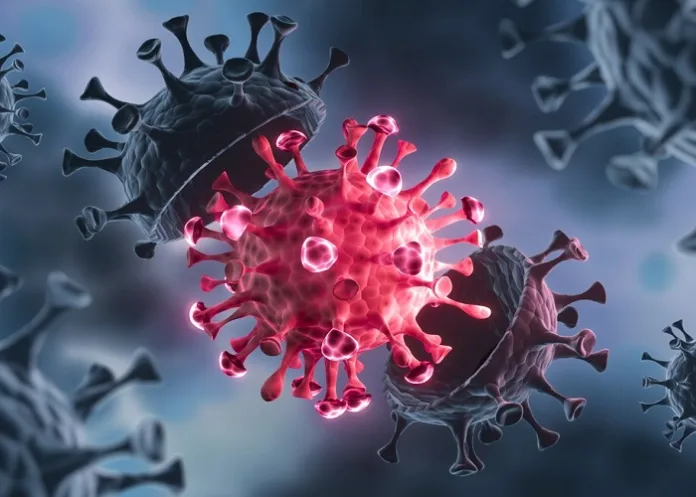Covid is evolving but are we doing enough to evolve with it. Writing in The Guardian, Professor Sheena Cruickshank says the vaccine-only strategy is inadequate, and there could be a danger of drug-resistance in countries dishing out antiviral medicines.
She writes:
We know Covid hasn’t stopped evolving, and we have a good idea about what sort of situations might result in new and dangerous mutations, but with less surveillance of emerging variants and spread, we are losing what used to be a near real-time picture of the situation.
This makes it harder to know which variants are driving the increase in cases (in England). The latest estimates suggest there is a soup, with several variants, including some derived from XBB, which emerged last year, as well as EG5.1 (Eris) and a small amount of BA.2.86 (Pirola), both of which were identified in the past few months.
It seems as though this virus is ever-changing, and as a reflection of that, new data released in the past few days show that the so-called Pirola variant has evolved again – and could be more immune-evasive than the XBB-derived variants.
So what drives this virus to change so much and so quickly?
As viruses rapidly replicate, they are more prone to acquiring mutations. So the larger the number of infections, the more chance the virus will change.
Many countries, such as the UK, have moved to a position of “living with the virus” without investing in testing, ventilation and infrastructure changes, and masking.
Add to this that vaccine coverage and access to boosters is quite limited, and there’s a recipe for many Covid infections – and a greater likelihood of the virus changing.
There is also a theory that dangerous variants may be more likely to emerge when immunocompromised people are infected.
Patients who are immunocompromised may struggle to completely clear the infection and this can enable the virus to persist at low levels and mutate over a long period of time.
This has led to speculation that the BA.2.86 (Pirola) sub-variant, which shares some similarities with the older BA.2 Omicron sub-variants, may be an offshoot of these viruses that persisted in an immunocompromised host and became dramatically altered over time.
This theory has been proposed for some time for other Covid variants of concern.
It is also becoming clear that the very drugs that can be used to help treat those with Covid can contribute to viral changes.
This has been recently demonstrated with the antiviral agent molnupiravir.
Molnupiravir actually works by creating mutations in the virus genome – many of these mutations stop the viral proteins from working properly, helping tackle the infection. Ideally the mutated virus wouldn’t spread, but a team of citizen scientists and researchers in the UK used sequencing data to show this is actually happening.
The types of mutations caused by molnupiravir are quite different from those that occur most often in Sars-CoV-2 evolution, so it doesn’t necessarily mean that the use of the drug is driving a more dangerous set of viral variants.
However, it does show that, akin to antibiotic resistance, we need to be aware and vigilant for the possibility of drug resistance emerging.
Molnupiravir is not as widely used in the UK – but it’s notable how variable access to antivirals and monoclonal therapies can be.
Countries like the United States widely prescribe antiviral agents, and other countries have enabled such drugs to be bought over the counter, while many middle-income countries have limited access.
The result is a patchwork landscape of inequitable access and potential overuse of particular drugs. This risks increasing viral resistance, more dangerous variants – and keeping those who need the drugs most without the help they need.
The vaccine-only strategy that the UK is using for vulnerable populations is an insufficient approach.
Even with boosters, not everyone will have as effective a response to the vaccine – for example if they are immunocompromised or on drugs that affect the function of their immune system.
Any person considered more vulnerable to Covid should be able to access well-regulated treatments, including monoclonals and antiviral drugs, to enhance their likelihood of tackling the virus – and head off the possibility of a chronic infection that could incubate new variants.
In reality, access in the UK is patchy, with a “Goldilocks effect”, whereby patients requesting them must be deemed ill enough to warrant the drug(s), yet not so ill the drugs would no longer be effective.
At least 500 000 people in the UK are considered clinically vulnerable.
One recently told me: “I’d feel much braver if I knew there were a backup if I get infected. But it’s not clear any treatment would be available, so I feel as if the responsibility for my health falls on me.”
We urgently need a plan across the world that addresses such inequalities – and assesses how we use and prescribe the drugs that can help those most in need.
• Sheena Cruickshank is an immunologist and professor in biomedical sciences and public engagement at the University of Manchester
See more from MedicalBrief archives:
First rise in Covid cases in six months, warn WHO, CDC
First SA case of Covid’s EG.5 variant
Molnupiravir demonstrates benefits against COVID – 3 studies at ECCMID conference
Merck’s COVID antiviral pill may halve the risk of hospitalisation and death

